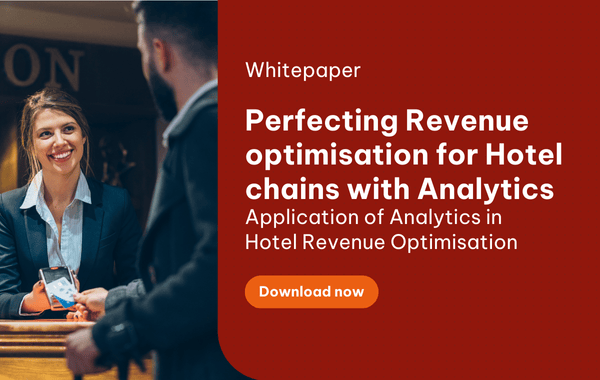Personalised services versus revenue management, which is more crucial for a hotel's success? This is a question that has sparked considerable debate among industry professionals.
While the goal of every business is to make a profit, focusing solely on higher earnings may overlook customer satisfaction, potentially leading to a loss of revenue.
Balancing these two aspects is no simple feat. However, understanding that they are not mutually exclusive but rather complementary can pave the way for a more holistic approach to hotel management.
Read more: Better Thrive in 2024 with These 3 Key Hospitality Trends
Contents
- Guest delight in the hospitality industry goes beyond mere satisfaction
- Guest expectations are not static
- Effective revenue management starts with having the right data

Guest delight in the hospitality industry goes beyond mere satisfaction
Guest delight involves ensuring that guests feel welcomed, satisfied, enriched, and receive value for their money. The experience should feel authentic and unique to each individual, creating lasting memories. This encompasses the entire journey, from the initial holiday planning stage to the eventual return, with seven main points of contact shaping the overall experience:
- Pre-Arrival: The initial interaction with the hotel, such as online booking, phone inquiries, and pre-arrival communication.
- Arrival: Encompasses the check-in process, welcome reception, and initial impressions of the property.
- Accommodation: The quality of the guest rooms, amenities, and overall comfort
- Food and beverage: The dining experience, room, and bar services
- Activities and amenities: Encompasses the recreational facilities, entertainment options, and additional services offered by the hotel
- Staff interaction: Behaviour, attitude, and helpfulness of all hotel staff
- Departure: The check-out process, final billing, and post-stay communication
Read more: 3 Ways A.I. is Providing Personalised Experience to Hotel Guests
These seven points of contact interact with each other to create a holistic guest experience. A positive experience in one area can compensate for a negative experience in another. Nevertheless, a negative experience at a crucial point can significantly impact the overall impression. Therefore, hotels need to focus on all seven contact points to ensure a consistently positive guest experience.
Guest expectations are not static
Today's guest expectations have shifted significantly, driven primarily by evolving demographics.
Millennials and Gen Z now make up more than half of the global population and the majority of the workforce. This demographic shift explains why the hospitality sector is closely monitoring the travel preferences of these two cohorts.
According to Bloomberg, Millennials are the largest generation to date, comprising 31.5% of the global population.
During the years 2020-2023, Millennials spent an average of $4141 per trip, going on 5.6 trips annually, surpassing Gen Z (4.4), Gen X (4.0), and Boomers (3.5).
Simply having stylish interiors and a trendy lobby bar may no longer be sufficient to captivate these young travellers. 97% express their intent to share their travel adventures on social media, with two out of three individuals posting daily. The constant social sharing is why Gen Z and Millennial travellers often prefer distinctive locations and genuine experiences that offer a glimpse into the local culture.
Moreover, 82% of Millennials express a desire to embark on eco-friendly vacations in 2023. Interestingly, Gen Z is even more environmentally conscious and willing to pay extra for travel providers that demonstrate environmental responsibility.
These modern travellers also expect seamless digital experiences, from online booking platforms to mobile check-in services and in-room smart devices. Personalisation has become a must. 80% of customers are more willing to do business with organisations that offer personalised experiences.
To meet these expectations, hotels are leveraging technology, such as in-room tablets for controlling room settings and requesting services, as well as augmented reality (AR) for immersive virtual tours.
This has led to the rise of experiential, unique, and immersive travel experiences rather than just a place to stay, namely a focus on local food, art, and activities, as well as sustainability-focused experiences such as eco-tours.
Read more: Sleep Tourism - Finding Rest in a Restless World
Experts estimate the global market for tours and activity reservations to reach USD 266.70 trillion in 2027, positioning experiential travel as one of the tourism segments with the fastest growth.
To meet these evolving expectations, hotels need to collaborate with local businesses and cultural institutions to create customised itineraries and immersive activities that showcase local culture and traditions.
Effective revenue management starts with having the right data
Revenue management in the hospitality industry involves predicting consumer behaviour to sell the right room to the right client, at the right moment, at the right price, on the right distribution channel, with the best commission efficiency.
This strategic approach uses performance data, local market data, competitor rates, future demand, and other applied analytics to optimise pricing and distribution, maximising revenue and profits.
The primary goal is to grow a hotel's overall revenue. It is a comprehensive strategy that utilises data analysis to make accurate forecasts for overall profits.
Read more: Seasonality in Hotels: Revenue Management Strategies You Should Adopt
Revenue management encompasses a network of interconnected components, each of which is essential in shaping the financial success of a hotel. These components do not operate in isolation; rather, they complement each other to create a comprehensive strategy that underpins pricing, policies, distribution, and marketing.
So, the debate between personalised services and revenue management is central to a hotel's success, yet it need not be a dichotomy. Both elements are crucial and, when harmonised, can significantly enhance financial performance and guest satisfaction, particularly Millennials and Gen Z, who seek unique, eco-friendly, and digitally integrated experiences.
Sources:
https://blog.pressreader.com/hotels/these-millennial-and-gen-z-travel-trends-are-shaping-the-future-of-hospitality
https://www.condorferries.co.uk/gen-z-travel-statistics#:~:text=TOP%20GEN%20Z%20TRAVEL%20TRENDS,likely%20to%20vacation%20somewhere%20unorthodox.
https://www.condorferries.co.uk/millennials-travel-statistics-trends
 English
English  Vietnamese
Vietnamese 


